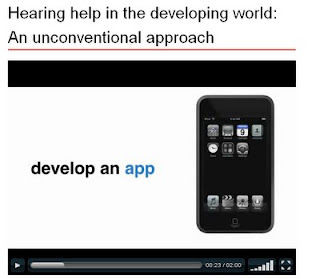He writes:
Hearing loss and deafness affect at least 278 million people worldwide, two thirds of whom live in developing countries with limited care. My idea is to use an iPod touch to test hearing (point of care diagnostics) and then use the same device and headphones as a personal amplification device to give people greater access to the world of sound.So, if you agree that this is a good idea, please help Bill to get funding by visiting the website and clicking "like"!


3 comments:
It's a nice idea, but how are they supposed to afford iPods in developing countries? And if these iPods were given to people for free, or even subsidised, how would the people be expected to keep them charged, or even safe from opportunistic thieves? Like I said, I like the idea, but I don't know how practical it would be.
Hi Dani, good point. Bill's research will hopefully show that there are cheaper options to hearing aids and that we can more easily help find money for iPods than we can hearing aids. I will ask Bill to comment though. Cheers, Anita
Dani, those are valid considerations and they were included in the body of the grant. We are exploring whether there is a more viable solution to provide not only hearing help, but hearing testing where next to none exists. This is a phased grant that, if successful for round 1, we will work to solve all the technical challenges as well as the logistical ones you point out. Phase 2 would be much larger and would work toward active deployment of the idea. Thanks for your interest.
Post a Comment